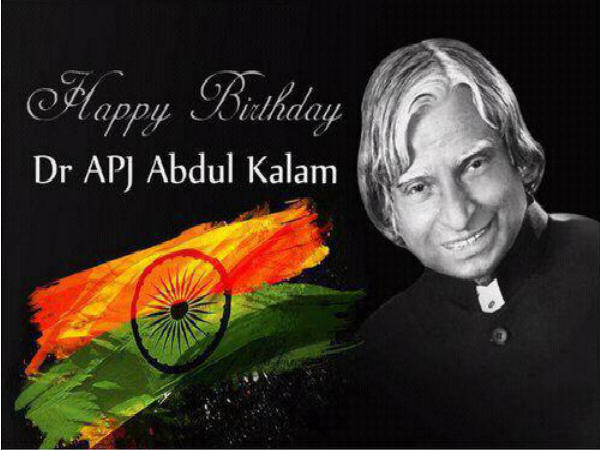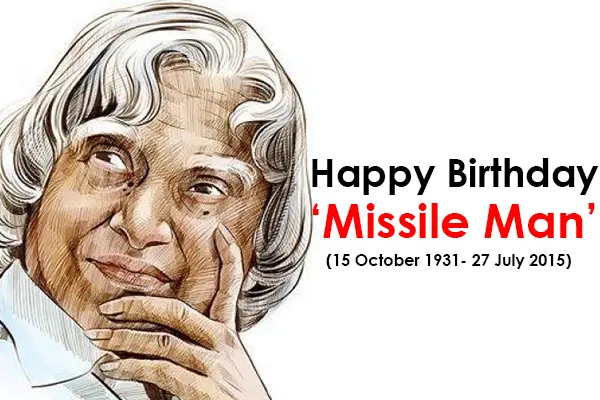Abdul Kalam Birthday: Today the birthday of 11th President Abdul Kalam is being celebrated across the country. His childhood was spent with a lot of struggle.
Abdul Kalam Birthday: Today the birthday of Dr. APJ Abdul Kalam, the 11th President of India (Dr. APJ Abdul Kalam Birthday) is being celebrated. World Students Day is also celebrated on 15 October in honor of the birth anniversary of Abdul Kalam. Kalam has contributed a lot to science and technology. He did a lot for the students. On 15 October 2010, the United Nations declared 15 October every year to celebrate the birthday of APJ Abdul Kalam as World Students Day.
Many years of childhood spent in conflict
Dr. Abul Pakir Jainulabdeen Abdul Kalam was born on 15 October 1931 in Rameswaram (then a Muslim family in Tamil Nadu). His father was a fisherman and his mother was a housewife. Three km from Kalam School, Rameshwaram Road Railway to help his father financially. He used to go to the station to distribute newspapers. He lived in his ancestral house which was as old as the 19th century. He lived with his parents and 4 siblings, of whom 3 were brothers and 1 sister.
Where did the inspiration for aeronautics come from?
Abdul Kalam got his early education from Rameshwaram Panchayat Elementary School. After this, he studied aeronautical engineering at the Madras Institute of Technology in 1957. When Kalam was in the fifth standard, the school teachers taught the children the principle of flying birds, but none understood them. Then the teacher took them to the seashore and showed them how birds fly in flocks of 10, 20, and 30. When they flap their wings, they get lifted and they fly away. This fell deeply on Kalam, who decided that he would later study aeronautics.
also received the highest civilian honor
In the year 1998, under the leadership of Atal Bihari Vajpayee, Abdul Kalam led 5 nuclear tests as the Chief Scientific Advisor. Abdul Kalam played a major role at that time by leading the Pokhran-II Nuclear Test, and since then he is called the best Nuclear Scientist in the country. From July 1992 to December 1999, he was the Chief of the Nuclear Testing Department of the country. He had made missiles named Prithvi, Agni, Trishul, Nag, and Akash. Given his achievements, he was awarded the highest civilian honor Bharat Ratna.
- In 1997, APJ Abdul Kalam received the Bharat Ratna from the Government of India and the Indira
- Gandhi Award for National Integration from the Indian National Congress.APJ Abdul Kalam Veer
- Savarkar Award was given by the Government of India in 1998.
- Awarded Doctor of Engineering by the University of Waterloo in 2010.
- In 2011, IEEE honored Kalam with IEEE Honorary Membership.
- APJ Abdul Kalam was awarded a Doctor of Laws from Simon Fraser University in 2012.
- Von Braun Award was given to APJ Abdul Kalam by the National Space Society in 2013.
- In 2014, I Doctor of Science from the University of Edinburgh, UK.
Dr. Kalam’s Principles
1- Those who are responsible, simple, honest, and hardworking, get special respect from God. Because they are his best creation on this earth.
2- Do the work of bringing light into someone’s life.
3- Get blessings from others, serve parents, respect elders teachers, and love your country.
4- Help at least two poor children in their education to make them self-reliant.
5- Learn from nature where everything is hidden.
6- We must wear the dress of smile and to keep it safe, our soul should wear the clothes of virtues.
7- Time, patience, and nature are the best doctors to remove all kinds of difficulties and heal all kinds of wounds.
8- Keep the highest and best goal in your life and achieve it.
The Shiva temple in Rameswaram, near the house of Dr. Kalam, the temple priest and father’s friend, had a profound effect on him, even though the place where he lived was a Muslim-dominated area. His life was influenced by Pakshi Lakshmana Sastri, the priest of Rameswaram temple, who was a friend of his father. He had heard both of them having spiritual discussions many times. Dr Kalam has mentioned that when he asked his father about the importance of prayer, his father had told that prayer works to unite souls. The body connects with the universe, which does not know the distinction of wealth, age, caste and creed.
Spiritual friends
used to answer every spiritual or religious curiosity of his father Dr Kalam objectively. At the same time, the inclination of spirituality always remained in his mind, after which he continued to have unique experiences. Apart from his father, he also mentions Ahmed Jalaluddin who was his relative, but even after 15 years of age, they still had friendly relations. Both used to discuss a lot on God and spirituality. He never doubted that the prayers offered in the temple and the mosque would have different implications.
Three Hindu friends
Apart from this, Dr. Kalam had three very good friends. Ramanand Shastri, Aravindan and Shiv Prakashan. All three were from traditional Hindu Brahmin families. In his childhood, he never saw discrimination of Hindu Muslim and all three remained his good friends throughout his life. In the fifth grade, a new teacher saw that a Muslim (Dr. Kalam) Hindu Brahmin was sitting with the children, so he made them sit separately. Both he and Ramanand Shastri felt very bad. After knowing this, Laxman Shastri explained to the teacher in front of both that they should not discriminate.

